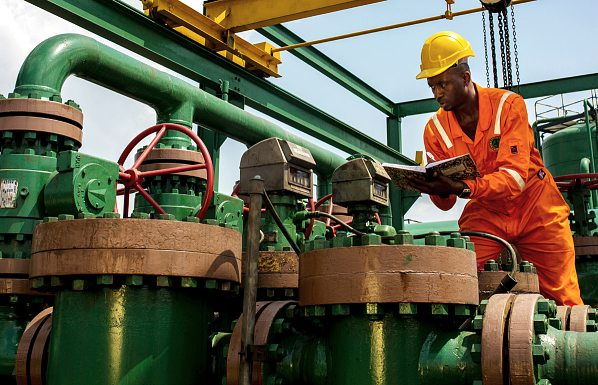
The challenge of oil
Thanks to colossal projects like the Dangote mega-refinery, Nigeria is determined to revitalize and make the most of the sector.
Oil is Nigeria’s economic mains - tay. The country’s large reserves make it Africa’s leading producer, surpassing Libya and Angola with a capacity of 1.25 million barrels a day. Black gold was first discovered in 1956 in Oloibiri, in southern Nigeria’s present-day Bayelsa State, then more generally in the Niger Delta. Production began between 1957 and 1960.
The Treasury Department puts estimated reserves at 37.billion barrels. The country’s economy and public finances largely depend on the oil and gas industry, which accounted for 78% of total export revenues in 2022. Pro - duction-sharing contracts and joint ventures have been set up with the government-owned Nigerian National Petroleum Corporation (NNPC), which manages the sector, but there are also some local producers. In addition to its major contribution to the economy, the oil industry also creates over 65,000 direct and more than 250,000 indirect jobs.
However, while Nigeria is a major oil producer, the country does not refine the precious resource despite having four govern - ment-owned refineries: three in the south and one in the north, in Kaduna State. In the late 1970s and early 1980s, when there were two operational plants, large amounts of its oil were refined abroad to meet domestic needs. Some of it is also processed in Cameroon, Ghana and Côte d’Ivoire.
Nigeria’s first oil refinery, in Alesa-Eleme, near Port Harcourt, began operating in late 1965 with a capacity of 38,000 barrels a day, enough to meet domestic demand at the time. In 1978, an additional refinery was built in Warri with a capacity of 100,000 barrels a day. A third, also with a capacity of 100,000 barrels a day, began operating in Kaduna, but did not reach peak production until the mid-1980s. A fourth was finished in Alesa-Ele - me in March, boosting Nigeria’s combined capacity to 445,000 barrels a day. Today the refineries are rundown and have been out of operation for years. The government is trying to upgrade them; they have produced little or no fuel in the past decade. The result is that Nigeria has its oil refined abroad and must import it, increasing the price. The country imports on average between 90% and 95% of the fuel it needs. Since the 1970s, the government has subsi - dized the price at the pump, which means that Nigerians pay much less for petrol than the market price. When the subsidy ended in May after President Tinubu’s election, the price skyrocketed by 230.78%, says the National Bureau of Statistics (NBS). Its repeal should free up funds allowing the government to invest in transport infrastructure, education and health. The Tinubu administration’s first hard-hitting reform was a brave step forward towards balancing the budget, says the new ruling team.
DIZZYING LOSSES
The new Dangote mega-refinery in Lagos State should allow Nigeria to stop importing fuel. Construction began in the Lekki free zone in 2014. With a capacity of 650,000 barrels a day, Africa’s largest refinery will produce 53 million litres of petrol a day, 20 million more than the country’s daily consumption. With BUA’s 200,000 barrels per day project, associated with the French company Axens, which will be operational in 2025, Nigeria hopes to boost its economic growth and foreign currency reserves. Its economy has not fully benefited from soaring global crude oil prices. The NBS says that in 2022, the oil industry directly contributed to 5.67% of GDP. It is also the leading provi - der of public revenue and foreign exchange reserves for the federal government. In recent years, however, government revenues have fallen, partly due to its tax diversification policy, lower production and the massive theft of crude in the Niger Delta. Estimated losses between 2009 and 2020 are put at nearly 620 million barrels worth €42 bil - lion. In 2022, federal tax revenues stood at 6.9% of GDP, while tax revenues from the oil and gas industry amounted to 1.8%, i.e. 26.1% of the total. Its real weight in the economy far exceeds its contribution to GDP.
Nigeria also boasts Africa’s largest natural gas reserves. Nigeria Liquified Natural Gas (NLNG), which began producing in 1999. runs the largest production facility jointly with several other companies and the federal states. With reserves of nearly 5.3 trillion cubic meters, Nigeria is Africa’s third-leading natural gas producer after Algeria and Egypt.
RESTRUCTURING INDUSTRY

The long-awaited 2021 Petroleum Industry Act (PIA), one of the boldest attempts to restructure the sector, provides the industry with a legal, regulatory, fiscal and governance framework. While a major source of revenue, the oil sector lags behind others in contribution to GDP. If implemented diligently, the PIA should help to foster Nigeria’s economic development by attracting national and international investors and opportunities in a safer environment.
The oil industry faces complex challenges, such as economic dependence, with Nigeria’s heavy reliance on oil revenues making its economy vulnerable to global price fluctuations. That is why one of the first things on the Tinubu administration’s to-do list is economic diversification. The development of agriculture and mining resources, among other things, are on the agenda. Corruption affects contracts, licenses and revenues, lack of transparency hinders the efficient management of oil resources and local communities often protest against oil companies because of the environmental impact, soil degradation, lack of profit sharing and social inequality. Oil spills have damaged local ecosystems, fisheries and public health.